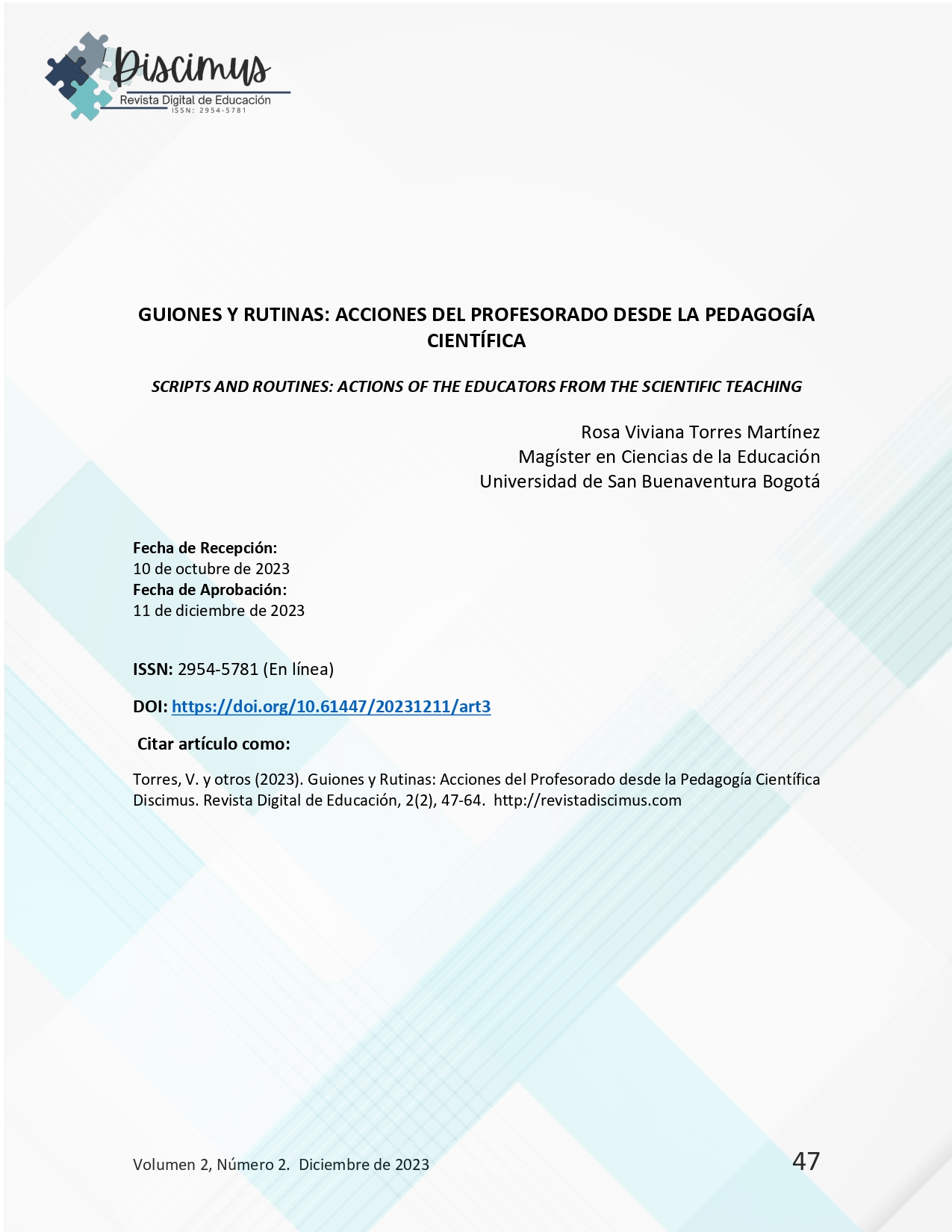Scripts and routines: actions of the educators from the scientific teaching
Main Article Content
Abstract
Scientific pedagogy gathers strength in the frame of the proposals made by María Montessori during the first half of the XX century. The edge it has can be found in the idea of intertwining discourses and medical, biological and anthropological practices in the education field, to strengthen the learning processes in the individuals and to achieve advances in their physical, psychological and behavioral development. Under this perspective, the teacher gets assigned the role of accompanying and guidance of the process of the students and for it, a series of scripts and routines are established, which will become instructions that the educator must accomplish to reach the objectives proposed in the learning framework. This vision regarding the role of the teacher can be contrasted with more recent proposals, which expand the horizon of meaning around the teaching profession and the implications it has in the process of forming individuals. Accordingly, some hypotheses are explored about the studies of the knowledge of the pedagogue where it is stated that scripts and routines, more than being an instructional aspect, is an unspoken way of knowledge that the educators maintain during the teaching process, which is built in a specific context and is represented in the series of structured actions than unconsciously are used by the teacher.
Downloads
Article Details
Section

This work is licensed under a Creative Commons Attribution-NonCommercial-ShareAlike 4.0 International License.
Open Access Policy at Discimus Journal
Discimus Journal is committed to the promotion of free circulation of scientific and academic knowledge, simultaneously ensuring appropriate acknowledgment for our authors while adhering to the ethical principles of scientific publishing. In alignment with this goal, Discimus publishes all its articles under the ATTRIBUTION-NONCOMMERCIAL-SHAREALIKE 4.0 INTERNATIONAL CC BY-NC-SA 4.0
How to Cite
References
Artola, I. y Coma, T. (2015). Utilidad de la metodología Montessori en un aula de pedagogía terapeútica. Educación y Diversidad, 9 (1-2) 115-130.
Barinas, G. L. Y Perafán, G. A. (2015). El conocimiento profesional específico del profesor de ciencias asociado a una ctegoría de enseñanza: estudio de caso sobre la noción de célula. Revista EDUCyT, 10, 34-48.
Castañeda, L. A. y Perafán, G. A. (2015). El conocimiento profesional del profesor: Tendencias investigativas y campo de acción en la formación de profesores. Pensamiento, palabra y obra, (14), 8-21. https://doi.org/10.17227/2011804X.14PPO8.21
Clark, C. M. y Peterson, P. L. (1990). Procesos de pensamiento de los docentes. En Wittrock, M. C. La investigación de la enseñanza, III. Profesores y alumnos. (pp. 134-148) Lisse: Sweets and Zeitlinger.
Freire, P. (1970). Pedagogía del Oprimido. Tierra Nueva.
Gimeno, J. y Pérez, A. (1992). Pensamiento y acción en el profesor: de los estudios sobre la planificación al pensamiento práctico. Morato.
Monteiro, R.; Carrillo, J. Y Aguaded, S. (2009). Guiones de acción de un profesor novel de ciencias a partir de la modelización de la enseñanza. Enseñanza de las ciencias, 27 (1), 77-88.
Montero, M. S. y Moreno, O. (2011).Pedagogía Científica y Normalidad en Montessori. Logos, (1) 20, 59-80.
Montessori, M. (1909). El método de la pedagogía científica, aplicado a la educación de la infancia en las “Case de bambini”. Araluce.
Perafán, G. A. (1997). Pensamiento docente y práctica pedagógica. Editorial Magisterio.
Perafán, G. A. (2004). La epistemología del profesor sobre su propio conocimiento profesional. Universidad Pedagógica Nacional.
Perafán, G. A. (2015).Conocimiento profesional docente y prácticas pedagógicas: El profesorado como productor de conocimiento disciplinar-profesional. Ed, Aula de Humanidades.
Porlán, R. (2000). Constructivismo y escuela. Ed, Díada.
Porlán, R., & Rivero, A. (1998). El conocimiento de los profesores. Ed, Díada.
Shulman, L. (1986). El saber y entender de la profesión docente. Revista de Educación, (15), 195-224.

